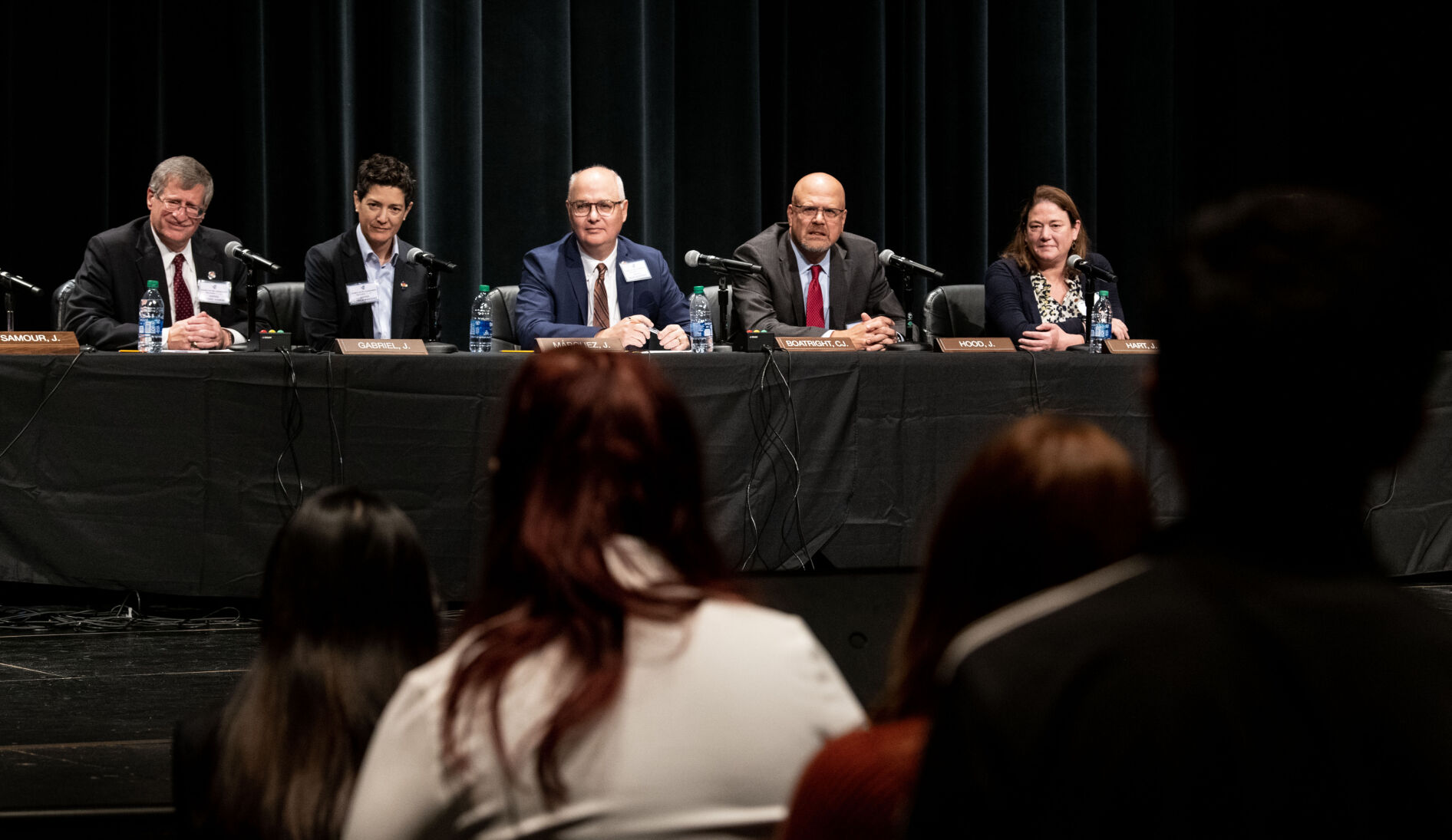Colorado Supreme Court accepts cases on forced blood draws, mineral rights

The Colorado Supreme Court agreed to review two cases on appeal in the past two weeks, with one questioning the constitutionality of forced blood testing on suspected drunk drivers and the other involving a dispute over oil and gas rights underneath a public street in Greeley.
At least three of the court’s seven members must consent to hear a case on appeal.
In addition, the justices showed interest in a third case, appealed directly from the trial court, involving the food delivery platform DoorDash and its owner’s liability for a delivery driver’s vehicle accident.
Is ‘expressed consent’ really consent?
Late one night in August 2016, Christopher Tarr was driving drunk in Aurora, well in excess of the speed limit, when he hit and killed Dalton McCreary in a crosswalk. A jury convicted Tarr of vehicular homicide and other offenses, and he received a 40-year prison sentence.
After the crash, first responders transported Tarr to the hospital. Law enforcement informed him about Colorado’s “expressed consent law,” in which drivers have automatically agreed to take a blood or breath test for alcohol content when an officer has probable cause to believe they are intoxicated. If a driver refuses, their license may be revoked and the refusal can be evidence at their trial.
The expressed consent law also enables police to perform a forcible blood draw when a drunk driver is suspected of certain serious offenses – vehicular homicide being one.
At the hospital, Tarr initially refused a blood test. After police learned McCreary had died, they informed Tarr a forcible blood draw was on the table. Tarr again declined to provide his consent and the hospital extracted his blood anyway. The results showed Tarr’s blood alcohol content was four times the legal limit at the time he struck McCreary.
Tarr attempted to block the test results from being used as evidence, arguing the blood draw – a “search” under the Fourth Amendment – required a warrant. The trial judge disagreed, believing the blood draw fit under an exception to the Fourth Amendment’s warrant requirement: consent.
A three-judge panel for the Court of Appeals subsequently analyzed whether the expressed consent law authorizing blood draws for vehicular homicide translates to a defendant’s actual consent to a search, even when the defendant is objecting in real time. Based on a 2017 Colorado Supreme Court decision, in which the justices definitively stated there is “no constitutional right to refuse a blood-alcohol test,” the panel said yes.
“Tarr consented to the blood test by virtue of the expressed consent statute,” wrote Judge Lino S. Lipinsky de Orlov in the February 2022 opinion, and “he had no constitutional right to refuse the test because the officers had probable cause to believe he had committed vehicular homicide.”
Judge David Furman wrote separately to ask the Supreme Court to hear the case. He pointed out the U.S. Supreme Court, in a 2019 ruling, appeared to back away from the idea that a state’s expressed consent law for drunk drivers can create, in the words of Justice Sonia Sotomayor, “actual and informed consent that the Fourth Amendment requires.”
The state Supreme Court will now decide whether the expressed consent law can justify a warrantless blood draw when the driver otherwise withholds his consent.
The case is Tarr v. People.
The centerline presumption
Decades ago, a developer purchased farmland in what is now the eastern part of Greeley. The lots were subdivided, W. 11th Street Rd. was constructed and the developer sold all of its parcels along the road.
Eventually, there was a discovery of oil and gas deposits underneath the original property. Extraction Oil & Gas, Inc. entered into drilling agreements with the owners of all parcels plus Great Northern Properties, which acquired the developer’s remaining mineral rights under the land – or so it thought.
In 2019, Great Northern filed a complaint in Weld County District Court seeking a resolution to a legal question: To whom should Extraction pay royalties for the oil and gas production underneath W. 11th Street Rd. itself?
“Based on the agreed upon facts, there are three basic groups that could potentially own the mineral rights beneath the West 11th Street Road: first, the developer,” wrote Judge Shannon D. Lyons, “second, the lot owners abutting West 11th Street Road; third, the City of Greeley.”
It was clear the city had no underground ownership, so Lyons applied the “centerline presumption,” a doctrine assuming that, for properties next to a right-of-way, ownership extends to the middle of the roadway. A goal of the centerline presumption is to avoid litigation over tiny strips of land.
Lyons found the Wyoming Supreme Court was the only state Supreme Court to address the issue, in which a majority concluded the space underneath a roadway is separate property altogether. Lyons rejected that interpretation, instead finding that where a developer has conveyed all its land to others, the centerline presumption kicks in. Therefore, the lot owners along W. 11th Street Rd. also possess the mineral rights from their properties to the centerline, and Great Northern does not.
The Court of Appeals upheld his conclusions last fall. Great Northern then turned to the Supreme Court, arguing the decision had “profound ramifications” for the oil and gas industry. The company also believed the ruling spawned more questions than it answered: If a developer creates 100 lots and sells all but one of them, for instance, does the centerline presumption not apply at all?
Oil and gas operators “will struggle to determine, exactly who gets what, and when under the new rule when it is applied to rights-of-way of all shapes and sizes in a variety of likely-unforeseen circumstances,” Great Northern’s attorneys wrote.
The Supreme Court has agreed to examine when the centerline presumption applies to mineral rights.
The case is Great Northern Properties, LLLP v. Extraction Oil & Gas, Inc. et al.
DoorDash liability
Finally, the Supreme Court indicated it could wade into an ongoing lawsuit in Arapahoe County over an accident between a motorcyclist and a DoorDash driver.
In August 2021, a delivery driver ran a stop sign and collided with Winthrop Elliott, causing Elliott to lose his leg. Elliott sued the driver and DoorDash, Inc. for negligence, alleging the driver was distracted by the DoorDash app while rushing to meet the company’s delivery deadline.
Last month, District Court Judge Elizabeth Beebe Volz acknowledged Elliott’s theory was that DoorDash creates incentives for its drivers to act recklessly, and Elliott was entitled to learn about DoorDash’s knowledge of unsafe conditions. She ordered DoorDash to produce all changes to its platform that came about as a result of driver crashes, plus all collision-related claims against DoorDash drivers in the three years prior to Elliott’s crash.
DoorDash then appealed directly to the Supreme Court, arguing Volz’s order was impossible to comply with.
“DoorDash operates in 27 countries and the DoorDash platform facilitates approximately 34,000,000 deliveries a week. Of the 34,000,000 weekly deliveries, approximately 3,060,000 may result in some form of a ‘complaint’ or ‘report’,” wrote the company’s lawyers. “Based on the frequency of complaints and reports, it is nearly impossible for DoorDash to decipher how many ‘complaints’ or ‘reports’ stem from a ‘collision.'”
The company further alleged that any reports would contain confidential or sensitive information that would require 13 million hours to review and compile.
The Supreme Court ordered Elliott on March 14 to respond to DoorDash’s petition. Already, Elliott has filed his answer, suggesting DoorDash is exaggering or outright lying about its ability to comply with Volz’s directive.
“Publicly, DoorDash proclaims how meticulously it monitors and reviews its crash-related claims for its own financial health and to protect shareholder investment,” wrote Elliott’s lawyers. “Yet to this Court, it now asserts that it cannot and does not even keep track of claims in the first place.”
The case is Elliott v. DoorDash, Inc. et al.














